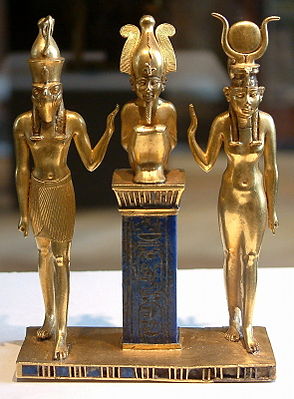Part of the Grand Plan?
An "impious fish" ate the phallus of Osiris.
What if that fish was female and transformed into Aphrodite, including Osiris' seed being encapsulated in 'fish eggs'. Perhaps after many seeds are distributed (Whore of Babylon, by plan? Temple Prostitution with a Purpose), one day Osiris will be regenerated in full form.
I find the 'missing parts' theme interesting also. The other day I read, once again, the story of the Horus/Set incident with the lettuce. Except this time, I saw details never seen/noticed before. [Brackets added.]
https://sites.lsa.umich.edu/mqr/2015/05/lettuce-and-kings-the-power-struggle-between-horus-and-set-2/
Lettuce and Kings: The Power Struggle Between Horus and Set by Morgan
Jerkins
According to Papyrus Chester Beatty I, the conflict between Horus and
Set happened to be a series of bouts, such as when they transformed
into hippopotamuses and submerged themselves into the water to see who
could last the longest, to Set removing Horus’s eyeballs as he slept.
Don’t worry, Horus was able to regain his eyes with the help of a
mistress named Hathor. But the story takes an erotic turn soon
afterwards:
Now afterward, (at) evening time, bed was prepared for them, and they
both lay down. But during the night, Set caused his phallus to become
stiff and inserted it between Horus’s thighs. Then Horus placed his
hands between his thighs and received Set’s semen. Horus went to tell
his mother Isis: “Help me, Isis, my mother, come and see what Set has
done to me.” And he opened his hand(s) and let her see Set’s semen.
She let out a loud shriek, seized the copper (knife), cut off his hand(s) that were equivalent. [I suspect it's only one hand...and
may reflect the many Bible verses of "My hand is stretched out
still".] Then she fetched some fragrant ointment and applied it to
Horus’s phallus. She caused it to become stiff and inserted it into a
pot, and he caused his semen to flow down into it.
Isis at morning time went carrying the semen of Horus to the garden of
Set and said to Set’s gardener: “What sort of vegetable is it that Set
eats here in your company?” So the gardener told her: “He doesn’t eat
any vegetable here in my company except lettuce.” And Isis added the
semen of Horus onto it. Set returned according to his daily habit and
ate the lettuce, which he regularly ate. Thereupon he became
pregnant with the semen of Horus. [Does this have anything to do
with the Bible verses that say men will one day travail as women?]
Towards the end of the story, both Horus and Set appear in front of
Thoth, who was another deity known to handle godly disputes:
Said Set: “Let me be awarded the office of Ruler … for as to Horus,
the one who is standing (trial), I have performed the labor of a male
against him.”
In other words, Horus cannot be ruler of Egypt because he had been
covered in sperm like a woman. Because Set has performed a “labor of a
male against him,” Horus cannot rule over anyone. He had already been
ruled.
Horus then took an oath by god as follows: “All that Set has said is
false. Let Set’s semen be summoned that we may see from where it
answers, and my own be summoned that we may see from where it
answers.”
Then Thoth, lord of script and scribe of truth for the Ennead, put his
hand on Horus’s shoulder and said: “Come out, you semen of Set.”
And it answered him from the water in the interior of the marsh. Thoth
put his hand on Set’s shoulder and said: “Come out, you semen of
Horus.”
Then it said to him: “Where shall I come from?”
Thoth said to it: “Come out from his ear.”
Thereupon it said to him: “Is it from his ear that I should issue
forth, seeing that I am divine seed?”
Then Thoth said to it: ”Come out from the top of his head.”
And it emerged as a golden solar disk upon Set’s head. Set became
exceeding furious and extended his hand(s) to seize the golden solar
disk. Thoth took it away from him and placed it as a crown upon his
(own) head […]
And so Set took a great oath by [the] god as follows: “He shall not be
awarded the office.”
What struck me about this incident is that it is the best origin for the Tree of Knowledge of Good and Evil I've ever seen. Horus' hand is the tree that produces both types of seed - His/good and Set's/evil, a blended fruit. Of course, the only way it works is if Isis took some of Horus' seed and placed it together with Set's in the sullied hand of Horus before tossing into the marsh.
